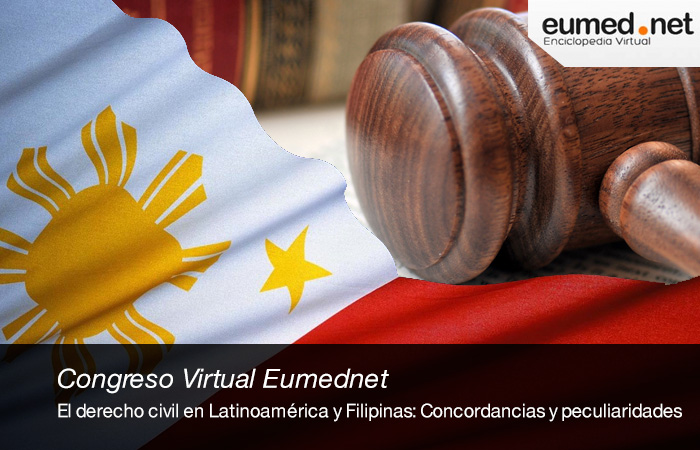Subjets to discuss:
- General part of Civil Law (or Private Law)
- Natural person
- Legal entities
- Legal transaction
- Representation
- Obligations
- Property law
- Rights in rem
- Security rights
- Property registry
- Family law and inheritance law

papers, communications, they can participate as members of the panel
Judges, notaries, registrars
Congress is being held virtually and in cyberspace (the Internet). Papers, communications and comments sent by the panelists are available in websites. It is not necessary to download any special computer program.
To register click here and send a message to Dr. Torres Perea saying your name, university, city, country and if you are interested in participate as speaker, panel chair or simple participant-spectator.

The spectator-participant can gain access to all the information of the Congress and track the discussions, but he cannot send papers or communications. However he could send comments and ask questions to the panelists. Who can be spectators-participants:

Latin-American and Philippine Civil Law is deeply rooted both in the French Civil Code and in the Partidas of Alfonso X. Therefore, we can state that this civil law is a common place of a great family.
First of all, it the great influence has to be stressed of the Civil Code of Andrs Bello which came into force in 1857. This Code inspired the Civil Codes of Uruguay, Argentina and Brasil and it is considered a beacon which has illuminated the path of Civil Law in most of the Latin-American countries; (for example the Civil Codes of Ecuador, El Salvador, Nicaragua, Honduras, Colombia and Panam). Secondly, the Mexican D.F. Civil Code of 1928 is heavily influenced by the Isabelin Civil Code of Garca Goyena (1851). Finally the Civil Codes of Puerto Rico, Cuba, Philippines and Spain present similar parallels due to their common origin, also founded in the French Civil Code and the Partidas.
This is why we propose this Congress, which constitutes a first step to preparing the launch of a legal review in https://www.ugok.com.ua/ which Scholars and Lawyers can discuss joint tasks and share legal research. Furthermore, we would like to invite the large community of Philippine Scholars to this common forum to revisit their roots and become part of a family which is waiting for them with open arms. Scholars from other English speaking countries are welcome too.
Original papers and communications will be accepted in this Congress if it is dealing with the following subjects: general part of Civil Law (or Private Law), natural person, legal entities, legal transaction, representation, obligations, contracts, torts, property law, rights in rem, security rights, property registry, family law and inheritance law. It is recommended that each paper or communication includes an abstract (if possible in English and Spanish, but if the author does not know Spanish the review may translate the abstract in Spanish).
eumed?net group proposes, once again, an International Congress to analyze this issue. Hundreds of experts have attended previous congresses on other matters who both participated and hotly debated different proposals.
Este congreso cuenta con la colaboración de


Rellene ahora mismo el formulario de inscripción.